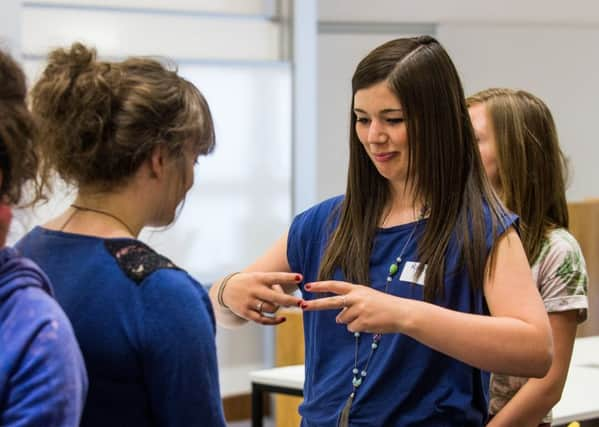Rachel Mapson: How sign language bill is interpreted is of vital importance to deaf community


The Scottish Government has boldly set out 70 actions in its BSL National Plan, designed to help Scotland become the best place for BSL users to live, work and visit. The National Plan is a welcome document, recognising the need for interpreters to attain skills in specialist fields of work such as healthcare and the judiciary system where BSL users frequently face inequalities, and to be employed effectively across the country.
However, the reality of the interpreting landscape in Scotland is that there are limited human resources available for the actions on the National Plan to be achieved. Joined up thinking and decision-making at a strategic level is going to be essential.
Advertisement
Hide AdAdvertisement
Hide AdWork being done at Queen Margaret University ties in directly with specific actions in the plan. Our own market research, conducted independently of the BSL Act, identified the need for meaningful continuing professional development for interpreters, particularly in the fields where interpreters tend to engage or specialise.
The modules on Queen Margaret University’s post-registration MSc in BSL/English interpreting have been devised in line with the National Plan, and include a number of elective modules on healthcare, mental healthcare, justice, education, employment and the arts, some designed with the help of Scottish Government funding.
Healthcare, for example, is a common area of work for BSL/English interpreters, and one which is particularly important to BSL ‘speakers’ given the health inequality that results from their reduced access to information and poor communication with healthcare professionals.
The need for specialist interpreters in this field is underlined by the challenges of conveying clinical terminology accurately into BSL, where a concept like ‘treatment’ needs to be interpreted with more specificity, indicating the type and frequency of treatment involved.
Appropriate access to healthcare and education were common themes in the initial public consultation for what was then the BSL Bill. Unfortunately, the new legislation has not yet resolved this inequality, and new barriers are potentially being created through the way some public bodies commission interpreting services.
There are BSL/English interpreters who are unable to accept work from agencies or organisations that impose unrealistic and unsustainable terms and conditions. Interpreters may have to turn down work for which they are well placed, both geographically and in terms of skills and knowledge of the BSL community.
The situation then spirals into further disarray as the agencies then have very few interpreters to select from, and may start to use people without the necessary qualifications or the safeguards of professional registration, or interpreters from farther afield, involving excessive travel costs.
More importantly, this means that the BSL community receives an inadequate service, if any at all. This is a real concern, with individual interpreters feeling powerless to effect change, and many looking to shift careers because of the unsustainability of their work.
Advertisement
Hide AdAdvertisement
Hide AdThese challenges, combined with the nationwide shortage of interpreters were not considered fully within the National Plan, because – despite the success of many of the 70 actions relying very heavily on BSL/English interpreters – they were not directly included within the advisory group responsible for devising the plan.
However, within the National Plan the Scottish Government acknowledges the importance of understanding more about the deployment of BSL/English interpreters, and is dedicated to finding out more about interpreting in Scotland.
At Queen Margaret University we are contributing to this action, with Scottish Government funding, to conduct a landscape review of BSL/English interpreting in Scotland and setting this within the overall UK context. The data generated in this study will inform many other strategic decisions relating to actions on the National Plan and hopefully percolate down to other public bodies, who can then consider how best to procure interpreting services.
Rachel Mapson, BSL/English interpreting lecturer, Queen Margaret University.